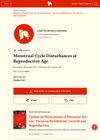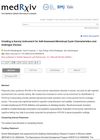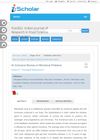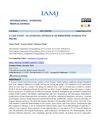 48 citations,
February 2013 in “Molecular and Cellular Endocrinology”
48 citations,
February 2013 in “Molecular and Cellular Endocrinology” The protein StAR is found in 17 different organs and can affect hair loss and brain functions, but its full role is not yet fully understood.
 19 citations,
July 2007 in “Dermatologic clinics”
19 citations,
July 2007 in “Dermatologic clinics” Tailor treatments for vitiligo to patient needs for best results.
[object Object]  8 citations,
June 2019 in “Orphanet journal of rare diseases”
8 citations,
June 2019 in “Orphanet journal of rare diseases” Corticosteroids are the most effective treatment for Satoyoshi syndrome.
 8 citations,
February 2017 in “Clinical Drug Investigation”
8 citations,
February 2017 in “Clinical Drug Investigation” Finasteride can cause sexual dysfunction and depression, which may persist and require hormonal treatment.
 January 2023 in “Archives of Disease in Childhood Education & Practice”
January 2023 in “Archives of Disease in Childhood Education & Practice” Hirsutism in teens is often due to polycystic ovarian syndrome and needs careful assessment and support.
 15 citations,
April 2016 in “Hormones”
15 citations,
April 2016 in “Hormones” Mutations in the NR3C1 gene cause a rare condition that affects hormone signaling and can lead to various symptoms, with dexamethasone as a treatment option.
 1 citations,
May 2023 in “Cell reports medicine”
1 citations,
May 2023 in “Cell reports medicine” Sons of mothers with polycystic ovary syndrome (PCOS) have a higher risk of obesity and insulin resistance, possibly due to certain genes and factors passed down from their mothers.
 1 citations,
May 2023 in “European Journal of Human Genetics”
1 citations,
May 2023 in “European Journal of Human Genetics” Rare ULBP3 gene changes may raise the risk of Alopecia areata, a certain FAS gene deletion could cause a dysfunctional protein in an immune disorder, and having one copy of a specific genetic deletion is okay, but two copies cause sickle cell disease.
November 2020 in “IntechOpen eBooks” Not getting enough minerals can lead to health problems and shorter lifespans.
 December 2016 in “Springer eBooks”
December 2016 in “Springer eBooks” Chrousos Syndrome is caused by mutations that make the body less sensitive to glucocorticoids, leading to various symptoms and requiring high-dose treatment.
 48 citations,
January 2011 in “Hormone Research in Paediatrics”
48 citations,
January 2011 in “Hormone Research in Paediatrics” The conclusion is that genetic changes in the glucocorticoid receptor can lead to conditions affecting stress response, immunity, and metabolism, requiring personalized treatment.
 1 citations,
November 2023
1 citations,
November 2023 PCOD mainly affects young women, causing symptoms like irregular periods and weight gain, with mixed success from lifestyle changes and medication.
 July 1996 in “Trends in Endocrinology and Metabolism”
July 1996 in “Trends in Endocrinology and Metabolism” The book is a valuable reference on androgenic disorders for professionals but not suitable for laypeople or medical students.
 14 citations,
September 2014 in “Journal of Pediatric and Adolescent Gynecology”
14 citations,
September 2014 in “Journal of Pediatric and Adolescent Gynecology” Irregular menstrual cycles in teenagers are linked to a higher risk of polycystic ovary syndrome and metabolic syndrome.
 5 citations,
March 2022 in “Frontiers in Endocrinology”
5 citations,
March 2022 in “Frontiers in Endocrinology” A model using hormone levels, cycle length, and BMI can help identify PCOS in Chinese women but isn't for screening teens.
 October 2011 in “InTech eBooks”
October 2011 in “InTech eBooks” Menstrual cycles can be irregular for women of childbearing age.
 2 citations,
November 2020 in “Fertility Research and Practice”
2 citations,
November 2020 in “Fertility Research and Practice” The survey helps identify menstrual irregularities and excess male hormones, aiming to detect conditions like Polycystic Ovary Syndrome.
 2 citations,
December 2022 in “Journal of Clinical Medicine”
2 citations,
December 2022 in “Journal of Clinical Medicine” Medications for glucose metabolism and weight control, combined therapy options, and herbal medicines may help regulate menstrual cycle in adolescents with PCOS.

In 2020, a new online survey was made to help identify Polycystic ovary syndrome (PCOS) in women, but it needs some improvements for better understanding and accuracy.
January 1997 in “Pediatrics in review” The document concludes that common menstrual disorders affect adolescent women, with the normal menstrual cycle lasting 21 to 35 days.
 29 citations,
October 2012 in “Anais Brasileiros De Dermatologia”
29 citations,
October 2012 in “Anais Brasileiros De Dermatologia” Diagnosing hair loss disorders needs clinical, dermoscopic, and histological differences, and checking menstrual cycle, weight changes, drug therapy, and nail changes.
 1 citations,
November 2023
1 citations,
November 2023 A healthy diet during menstruation is crucial for women's well-being and their children's health.
 June 2022 in “Foodsci: Indian journal of research in foods and nutrition”
June 2022 in “Foodsci: Indian journal of research in foods and nutrition” Eating better, exercising, staying clean during periods, and learning about health can help reduce menstrual problems and improve life quality.
August 2022 in “Metabolic Brain Disease” Ferulic acid may help control menstrual cycle-related epilepsy by affecting female hormones.
 6 citations,
April 2019 in “Journal of Pediatric Endocrinology and Metabolism”
6 citations,
April 2019 in “Journal of Pediatric Endocrinology and Metabolism” Metformin improved menstrual cycle regularity and signs of hyperandrogenism in adolescent girls with type 1 diabetes but did not improve blood sugar control.
[object Object]  3 citations,
December 2016 in “PubMed”
3 citations,
December 2016 in “PubMed” Menstrual abnormalities in PCOS women may not greatly affect their metabolic and hormonal profile.
 30 citations,
February 2003 in “Annals of Neurology”
30 citations,
February 2003 in “Annals of Neurology” Progesterone and related compounds may help control seizures linked to the menstrual cycle but have limitations that need addressing.
 8 citations,
February 2003 in “Annals of Neurology”
8 citations,
February 2003 in “Annals of Neurology” Progesterone treatment improved seizures in a woman with menstrual cycle-related epilepsy, but a wrong medication worsened her condition.
 January 2024 in “International Ayurvedic medical journal”
January 2024 in “International Ayurvedic medical journal” The Ayurvedic treatment helped a woman with PCOS, improving her symptoms and menstrual cycle.
 2 citations,
February 2003 in “Annals of Neurology”
2 citations,
February 2003 in “Annals of Neurology” Neuroimaging suggests that treatments targeting brain steroids could help control epilepsy, especially types linked to the menstrual cycle.


























